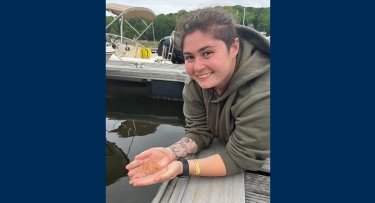Biology Major Excels in Prestigious Fellowship

At Mercy College, biology major Jayda Smith ’24 is pursuing her passion for marine conservation, while gaining valuable experiences and recognition along the way.
Last year Smith was awarded the highly competitive Tibor T. Polgar Fellowship from the Hudson River Foundation (HRF), a non-profit organization that supports environmental research on the Hudson River and its watershed. As one of only six undergraduate students to receive the honor, Smith has spent the past year conducting environmental research and compiling her findings in a report to the Foundation.
Under the guidance of her Mercy College mentor, Assistant Professor Bobby Habig, Smith chose to study the impact of nine dams on the Bronx River. She spent last summer collecting and analyzing samples of marine life that live in dammed sections of the river. “Dams are often blamed for having a negative impact on fish and other organisms,” Habig explained. “But Jayda’s study, which focused on the river’s small bottom-dwelling invertebrates, intends to show how such organisms are an important part of stream ecosystems and useful indicators of stream health.”
Last fall Smith wrote and presented her research in a paper titled, “The Impact of Dams on Benthic Macroinvertebrate Diversity in the Bronx River,” which will be published this summer on the HRF website. This fall, she will continue working with Habig, whom she calls “my number one supporter at Mercy” as she completes her research capstone in biology. Her next goal is to publish her findings in a peer-reviewed scientific journal.
“When students like Jayda take advantage of opportunities to do field or lab work, they inspire a new generation of scientists,” said Habig. “Having a research component under their belt also makes them more competitive for programs and careers. So not only is Mercy encouraging students to explore a wider array of career paths, but it’s also helping to create a more diverse scientific workforce.”
As Smith nears graduation, she plans to apply for doctoral programs in marine conservation, and her target school is SUNY Stony Brook. “I’ve been advised to consider going for a master’s degree and my doctorate simultaneously,” she said, and Habig concurred. “With a research fellowship, an oral presentation and a published paper to her credit, her chances of success are very good,” he said.
